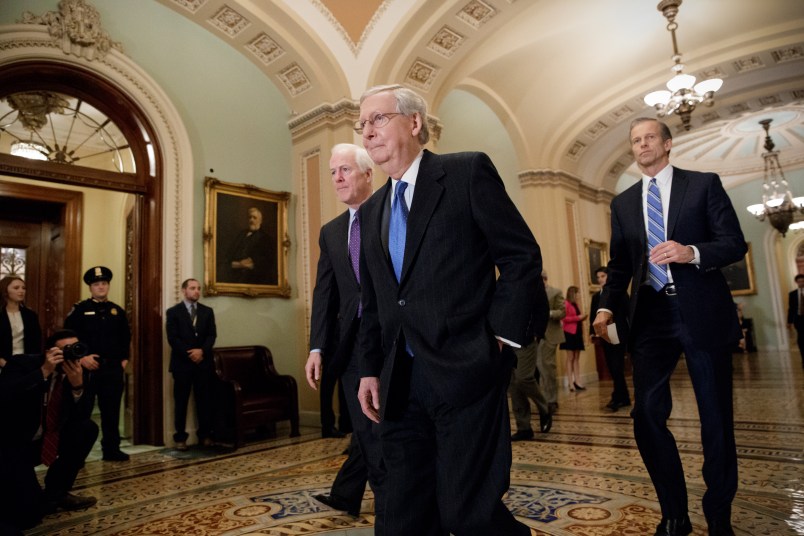The Republican response to the highly-anticipated Congressional Budget Office report on the GOP health care bill—which found it would cause 24 million people to lose their health insurance over a decade—has been all over the map.
Some trumpeted the CBO’s estimate that the bill would lower the deficit by hundreds of billions of dollars and bring health insurance premiums down over time. Others questioned the office’s credibility, calling the report incomplete, or rejecting the findings all together.
On Tuesday, the Senate’s Republican leaders did a little of each.
After a closed-door lunch with Vice President Mike Pence and Health and Human Services Secretary Tom Price, Majority Leader Mitch McConnell (R-KY) told reporters that the CBO score vindicated Republicans’ fiscal promises for the repeal of the Affordable Care Act.
“It shows we have a pathway to lower premiums, lower taxes, lower deficits, and the most significant entitlement reform in history,” McConnell said.
Minutes later, from the same podium, with McConnell standing by his side, Sen. Roy Blunt (R-MO) said the CBO is not a credible source of information.
“The Congressional Budget Office is notoriously bad at anticipating what’s going to happen in the marketplace,” he said. “They’re sometimes not even good at adding and subtracting.”
Blunt used the same inaccurate talking point popular with his Republican colleagues and the White House: that the CBO was so far off on its analysis of Obamacare that the American people shouldn’t trust its reports today. In fact, the CBO’s early estimates of the total number of people to gain coverage under Obamacare and the average cost of premiums have been quite close to the real outcomes.
“This is something CBO doesn’t do very well,” he said of health care reform bills. “They haven’t been right any time in the past.”
Reporters pressed the Senate leadership on this dual message, noting that they are treating the parts of the CBO report that they like as trustworthy while dismissing as flawed the parts that make them look bad.
McConnell responded by doubling down. “The part I think is an accurate reflection is the tax reduction, the likelihood of premiums going down, and the Medicaid reforms,” he said. “What Senator Blunt pointed out that it’s pretty hard to predict coverage when the government stops telling you that you have to buy something you may not want.”
Cost and coverage, however, are inextricably intertwined. You can’t dismiss one and accept the other, because the total number of people covered by the AHCA would have a huge impact on the cost to the federal government. The lower health insurance premiums McConnell is celebrating are also linked to millions of people losing their health insurance. If older, sicker people can’t afford coverage and opt to go without it, premiums will go down for those who remain in the health insurance pool.










